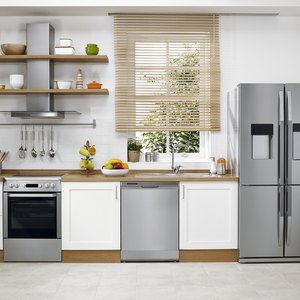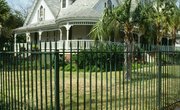
Landlords enjoy a wide array of deductions they can claim for rental property. Most expenses related to renting a home – including appliance purchases, repairs and improvements – are deductible. Appliance purchases and improvements are capitalized and depreciated, while appliance repairs are expensed.
Tips
Purchasing appliances for a rental home can act as a qualifying tax deductible expense. Appliances can also qualify for asset depreciation on a tax return.
Appliances Are Tax Deductions for the Landlord
Purchases of major appliances like a refrigerator, carpet, stove, washer and dryer are all tax deductions for landlords. However, you may not be able to deduct the entire cost of the appliance the year you buy it. That's because the IRS considers these purchases to be assets rather than expenses. Assets are depreciated and deductions are taken over their useful lives. The IRS provides a table that defines the useful life of common appliances used in rental property. Appliances like refrigerators, stoves and carpets have a useful life of five years.
Section 179 and Accelerated Depreciation
You may not have to wait the full five years to get your tax deduction for appliance purchases. Section 179 of the tax code allows landlords to immediately expense up to $1 million of new or used appliances in 2018 ($510,000 for 2017). For most landlords, this will cover the cost of any and all appliances placed in service. This benefit begins to phase out is you purchase assets or make improvements totaling over $2.5 million. If there is property that you can't immediately expense through Section 179, you can use the modified accelerated cost recovery system to take a larger tax deduction the first few years after purchase.
Appliance Repairs and Improvements
If you're simply repairing an existing appliance, you can count the cost under repairs expense and take an immediate tax deduction. However, if the cost is actually an improvement and not a repair, it needs to be added to the basis of the asset and depreciated. The key distinction between a repair and an improvement is that an improvement betters, adapts or restores the asset. It's restoration if you're storing the appliance after you've finished depreciating it or after you've taken a loss on it.
Claiming the Deductions
To record the profit and loss from your rental business, fill out Schedule E of Form 1040. List repairs and maintenance expense for the year in line 14. If you purchased appliances or made improvements, you need to independently calculate depreciation for the year and enter it in line 18. Most accounting software has asset modules that will calculate depreciation for you or you can reference the IRS guidelines and calculate it by hand. Enter the total rental income or loss from line 26 onto line 41 of the Form 1040 and include Schedule E with your tax return.
References
Writer Bio
Based in San Diego, Calif., Madison Garcia is a writer specializing in business topics. Garcia received her Master of Science in accountancy from San Diego State University.

